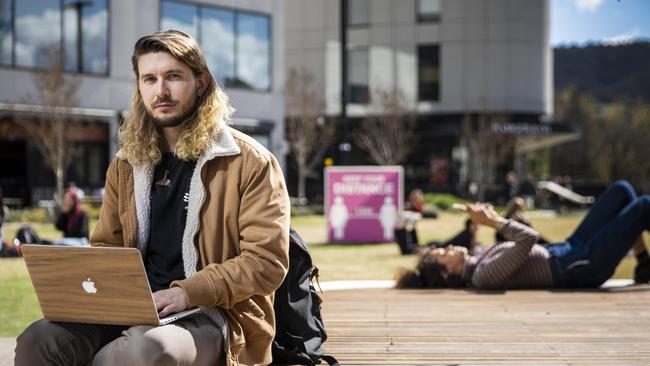Universities under fire over poor-quality teaching
Universities are using years-old lectures to fill the gaps caused by pandemic online learning.

Universities are using years-old lectures and sharing them across different courses, leaving the nation’s students worried about the quality of their education and future job prospects.
Student unions across Australia are sounding the alarm about how social-distancing restrictions, massive job layoffs and funding cuts have led to blown-out class sizes on zoom and less direct student-teacher interactions.
Students fear quality standards are slipping and are questioning why they are paying high fees for out-of-date content, claiming academics are “asleep at the wheel”.
At ANU, history subjects are recycling 2019 lectures instead of uploading fresh content, despite some of these courses costing nearly $7000. Under the government’s student fee overhaul, these courses will cost as much as $14,500.
A May lecture for an economics unit at the university was later used by the same tutor for a sociology subject, despite clear differences between the two disciplines.
“Note that I recorded the video of this lecture (in two parts) for the other lecture I am teaching this semester (an ECON course) but the content is identical to what I am teaching SOCY,” the lecturer wrote to students.
ANU disabilities officer Zoe Ranganathan said the student union was inundated with concerns about the quality of online learning. “There was one politics lecture that warned the references were all dated 2015,” she said. “And there’s one lecture shared over two subjects. Tutors are scrambling to deal with job cuts and COVID-19, but many students are struggling with online learning.”
An ANU spokesman told The Weekend Australian staff were working “incredibly hard” and lectures were augmented by in-depth tutorials. “We recommend (students) speak with the course convener in the first instance, and then the appropriate Associate Dean of Education, the Dean of Students or bring it to the attention of the University,” he said.
La Trobe University’s academic board student representative Stephanie Briese has also collated more than 50 complaints from students in semester one about online learning to bring to the university’s governing body.
Ms Briese said students had come to her about Zoom classes with more than 80 students, units where two-hour lectures have turned into 15-minute videos, and one claim that a class used a lecture prerecorded seven years ago.
“There has been a problem with using old content recordings, with one student reporting to us that a lecture from 2013 is being used,” she said. “There needs to be caps on Zoom classes, a push to have up-to-date content, and the weighted average mark should not be affected by the issues online learning has caused.”
A La Trobe University spokeswoman said there were limited examples where old content could be carried over and staff updated teaching materials each semester.
“In some limited instances, after each semester’s review, some subject material may not change as the content and principles … remain constant,” she said.
“In 2020, we provided dedicated professional development and education technology support to rapidly upskill in repurposing recorded materials for effective online delivery.”
University of Queensland student union president Ethan Van Roo Douglas said he had received complaints about old lectures being recycled, and that dozens of students had complained that online exams had included questions directly lifted from previous years’ exam papers.
“The university’s academic arm needs to deal with this,” Mr Van Roo Douglas said. “Some lecturers have clearly taken an asleep-at-the-wheel attitude.”
A UQ spokeswoman said all lecturers were expected to update their lecture material and that chief examiners made sure exams were “substantially different” year-on-year.
But National Union of Students president Molly Willmott said she was getting complaints about the quality of online learning “from Perth to Townsville — it’s everywhere”.
“We can’t have online learning leading to quality standards slipping after the pandemic. We have concerns about lectures, and a big concern about the lack of pastoral care for students,” she said.
Six months ago, 25-year-old Queenslander Ayden Nicoll was entertaining aboard a cruiser travelling through the Caribbean but is now stuck on his laptop most days in his Canberra flat studying his university degree online.
He was set to go back to the US and continue travelling around the world, but Scott Morrison closed the nation’s borders while he was home for a visit. Like thousands of young Australians hit by the pandemic, Mr Nicoll decided to try university campus life but he has been demoralised by the campus restrictions.
“We need permission to have people over to our accommodation on campus, and we’re only allowed to have activities in really small groups,” he said.
“Some of the online classes have been amazing, but some of them are using old slides, and then there are hundreds of people in the classroom … it’s all made my campus experience very difficult.”




To join the conversation, please log in. Don't have an account? Register
Join the conversation, you are commenting as Logout